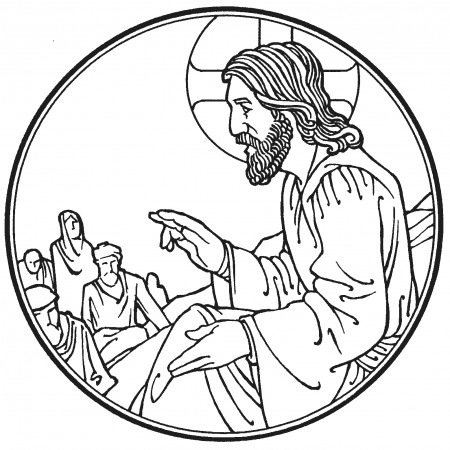The Fourth Sunday after Trinity
Luke 6:36–42
☩ IN NOMINE IESU ☩
Our Lord’s summary of the second table of the Law is not simply “Love your neighbor.” It is “Love your neighbor as yourself.” “As yourself” is a command to empathy. The golden rule, “Do unto others as you would have them do unto you,” also demands empathy. It is not enough that we do right to others. We are to do to them as we would have them, as we desire them to do unto us.
Empathy involves more than mere action, more than what we should do or not do unto to our neighbors according to their needs. Empathy changes how we look at, how we think about our neighbor’s faults, sins, and fortunes.
Empathy is commanded because our fallen minds and hearts are not empathetic. They’re selfish. When we consider our own actions, we always have an excuse. We want to be admired, we think we’ve earned what we have, and that people should respect us because of it. But when we consider the actions of others, we see serious character flaws, we see people who didn’t earn what they have, but were born with silver spoons in their mouths. We are all hypocrites. We all invoke a double standard. We should be ashamed.
Take, as an example of this, our road rage: Our indignation that someone would cut us off or drive slowly—perhaps the speed limit—on a two-lane road. Our vanity would have us believe that we are good drivers. We’re not. You’re not. Face the truth. We are all terrible drivers. There aren’t any good drivers. None of us obey the laws—always. None of us concentrates as he should. When we keep the law, or almost keep it, we do it out of fear of punishment, not because we recognize the safety issues involved or care about fuel consumption.
And, yet you have deluded yourselves to think that when you just so happen to cut someone off, when you just so happen to get a speeding ticket or get into a fender bender it was truly an accident. That you couldn’t do anything about it. That it was really the other person’s fault. That the cop was out to get you because it was the end of the month, that there was a conspiracy to make you late by everyone on the road, so you had to speed. That you were somehow justified by the circumstances or some other such nonsense. If you were not a hypocrite, you would never become angry at other drivers.
And on down the line, the excuses and justifications keep coming. This is why you so delight in playing the armchair quarterback, politician, and theologian This is why you think you could be a better coach than Lovie Smith or Rick Reinhardt. A better president than Barak Obama or Ronald Reagan (depending I suppose what side of the issues you might be on). And better at running the church than Jesus himself, pretending to be nicer than, more loving and caring than God, putting love before doctrine and personal feelings before the clear Word of God.
And this is also how you see each other’s sins. And so you hold grudges. You think of all the evil they’ve done and speak ill of them behind their backs. You question their intelligence, their sincerity, their honesty, and their faith. You refuse to speak well of them, to defend them, to explain everything in the kindest of ways. And why? Because they don’t deserve it. They haven’t lived up to your standard. And you hate them for it. But remember that we despise in others what we most despise about ourselves. And so you hear what you want to hear, and you see what you want to see. You are the judge, the jury, and the executioner. But you have judged not only them, but yourself also.
For They don’t deserve it. This is true. But neither do you. Our Lord says: “Be merciful as your Father in heaven is merciful. . . . For with the measure you use it will be measured back to you.” Repent.
We are all beggars, we are all unworthy of the love that is lavished upon us. None of us live out this love, this mercy, that is poured upon us, and are as merciful as our Father is merciful. For The deeper we look into our hearts, the more hypocrisy we find. Yet, love is lavished upon us anyway, good measure, pressed down, shaken together, and running over.
This is what ought to take our breath away and change our minds and hearts: the Lord removes the logs from our eyes, despite who we are and what we have done or failed to do. Your Father is merciful. He is the perfect embodiment of His Word. He does what we have never done. He loves us as Himself, does to us what He would have done to Himself. He loves us perfectly, without fail, without holding anything back. He keeps the Law for us and then He allows the Law to to do to Him all it should have done to us, and then makes it counts for us. His good works, His mercy, His love is counted as ours and our sins are counted as His.
This mercy is full and without end. It is utterly unencumbered: He simply loves us. There is no baggage, no grudges, no fear in God that we will reject Him again or take advantage of Him, even though He knows full well we might. We might, but He will not stop. He will not quit. His mercy endures forever.
His mercy is without any deceit. There is no partiality. All of humanity has been reconciled to the Father in the Son, declared righteous, none are deserving, none are truly better than the others, none are lacking this saving love from God, though, sadly, some are lacking faith and reject this love. All are loved, the good and the bad, the greatest and the least. And thus does He cause His sun rise over the evil and the good, even as He causes His Son to pay for every sin.
This is real mercy, not a frustrated giving-in. He does not pooh, pooh our sins and say, “no problem.” He dies for sin. Nor does He love us with words alone, but He loves us in deed and truth. He not only removes the guilt of our sin and give us His Name and the promise of a future, but He also feeds us, provides for us, and prepares a place for us beyond the grave.
His mercy is unchanging and inexhaustible. He is constantly moved by compassion. And this mercy is free. He does not love for the sake of reward. He is not self-seeking. He does not love those who can or will love Him back, but he loves all regardless. He does not see a log or speck in your eye or any flaw: He sees perfection, an immaculate bride, a friend. Your Father is merciful because that is His nature, because He is good, because He is love.
Be merciful as your Father in heaven is merciful. Do unto others as you’d have them do unto you. Love your neighbor as yourself. To do that is to submit those who have wronged you, those against whom you harbor ill will, malice or anger in your hearts, to the Father’s mercy in prayer. For when you give them to God in prayer, you give them God’s help, you give them God’s mercy as only He can give it. And so Bring them all with you to the altar, And as you kneel in the heavenly holy of holies, as you receive the body and blood of Him who died for you, hand those cares, those burdens, those grudges, and sins over to your merciful Father in heaven. For in so doing you do unto them as you’d have them do unto you. You give them to the God who is merciful and with that prayer you ask God to treat you as you have treated them—in mercy. And he does. For This mercy is poured out lavishly, shaken together, pressed down, and overflowing, in the Cup of His Blood given to you to drink for the forgiveness of your sins.
This is how the Church lives—in and by the Father’s mercy. It inhales God’s mercy through Word and Sacrament and it exhales it in love, service, and prayer for our neighbors. Let us be and live as the Church. Amen.



0 Comments